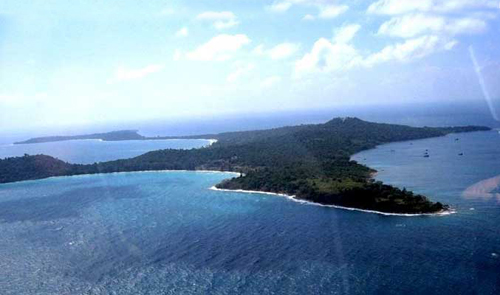Cooperating with Cambodian liberation forces, Vietnamese troops defeated the Khmer Rouge and entered Cambodia, including Koh Tang Island, in January 1979 and collected evidence of genocide by the regime led by Pol Pot.
Vietnamese colonel Bui Van Bong recalled seeing the gruesome evidence of the killings when he set foot on Koh Tang, an island off the coast of Preah Sihanouk Province in the Gulf of Thailand. In the Cambodian language, ‘koh’ means ‘island’.
Since 1979, the island was put under management of a Vietnamese military unit because the Cambodian army was unable to defend the island. Phong Dot, head of the military school in Cambodia’s Kampong Son, told Bong in 1979, “The Cambodian army has just been set up and is unable to defend islands in the outpost. We are confident with the help of Vietnamese forces.”
Bodies at the foot of coconut trees
Koh Tang is a beautiful island northwest of Phu Quoc island, Vietnam’s popular travel destination well known throughout the world. Koh Tang is around 7km long and 100m - 3km wide, surrounded by clear blue ocean. Some white sand beaches of Koh Tang are known for their coral reefs.
Forests on the island are made up of various species of precious trees and exotic animals.
Nguyen Duc, head of the island, revealed that the coconut trees on the beaches of Koh Tang were luxuriant, a result of the blood and flesh of Vietnamese and Cambodian civilians killed by the Khmer Rouge. Their bodies inadvertently fertilized the trees decades ago.
“This island has over 2,000 coconut trees that were planted in 1976 and 1977, and human bones were discovered at the base of the trees. Some trees have two or three corpses beneath them,” said Duc. “I have seen several bodies not yet fully decomposed with the hands tied and skulls broken.”
“We buried them and built their tombs upon setting foot on this island,” Duc added.
No one living on the island survived and so all of the evidence of the massacre has been collected by Vietnamese and Cambodian soldiers since 1979, according to Duc.
Many identity cards, souvenirs, and clothes that were found prove that Vietnamese lived on the island as well as Cambodians.
513 civilians from Vietnam’s Tho Chu Island were kidnapped and brought to Koh Tang in May 1975. They were forced to do hard labor until they were executed by the Khmer Rouge.
Nearly 1,000 people, including Vietnamese, were forced to build fortifications, trenches, tunnels, and plant fruit trees and keep poultry and cattle on Koh Tang.

513 Vietnamese civilians were carried from Vietnam's Tho Chu Island (beneath) to Koh Tang in 1975. On the right is Phu Quoc Island of Vietnam
Pointing at a small tomb, Duc noted that it is of a Vietnamese mother and her child who were tied to one another and had their skulls broken. “Maybe they killed her and her child in late 1978 because their bodies were not fully decomposed in early January 1979,” Duc recalled.
“In her pocket, we found an identity card with the name of Nguyen Thi Tua, 29, from Tho Chu. The paper was granted by South Vietnam on February 20, 1968.”
Several meters from the tomb, a tall tree stands alone with dense bushes beneath. “The tree was where most civilians were executed. When we arrived here, the foot of the tree was smooth with countless footprints on the soil nearby. Sticks, ropes, hammers, and knives were scattered around the tree. Dry blood stains were everywhere,” Duc said, alluding to the fact that the innocent were bound around the foot of the tree, tortured, and killed.
Over a wooden bridge that crosses a lake are houses built on stilts. The houses have tiled roofs and wooden floors. Duc said he could confirm the houses were home to Chinese experts thanks to papers, documents, jewelry, and letters found by Vietnamese troops in early 1979.
























































